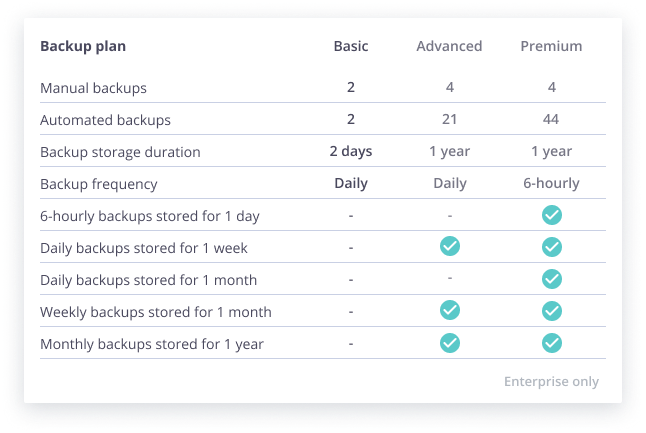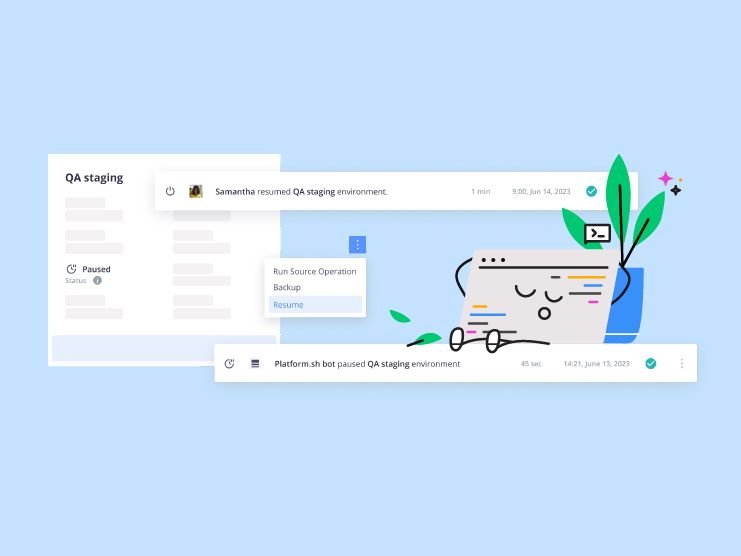You asked and we delivered! The days of configuring cron jobs to take backups for each of your environments are over.
Now, for every project, you will have your backups automated according to the plan of your choice. Meaning you can focus on deploying today without worrying about if you can still roll back to yesterday - our new Automated Backups feature has you covered.
What are Automated Backups?
When it comes to the topic of disaster recovery for your websites and/or applications, the decision between backups vs. snapshots can be a tricky one to navigate. While snapshots capture your configuration, settings, and system state, they don’t capture data. Meanwhile, a backup is a daily complete byte-for-byte backup (copy) of your entire production environment including the stored data.
That’s exactly why we developed Automated Backups for our platform. With this new update, our users can turnback time to restore their environments from a backup is just a click away. But, how does it work?
What's the process?
Our new Automated Backups process simplifies the process of securing your environments and backing up your websites and applications. All you have to do is choose the backup you wish to restore your environment from, and click Restore.
But, what kind of backups will you have to choose from? That depends on when the last backup was created, but who’s going to remember to take a backup of each site, every day so that you have the choice of backups you need?
We will - through the power of automation, of course! Platform.sh creates daily automated backups for every project without you having to do a single thing. This means that every production environment will meet a Recovery Point Objective (RPO) of, at most, one day - depending on your chosen backup plan. You’ll even be able to create your own backups on top of the automated ones, if you ever need to.
Once you’ve selected the backup you wish to restore, your website or application will then be running like it was when the backup was created allowing you to get back to business with minimal disruption.
How does Platform.sh manage Automated Backups?
Through our Automated Backups process, we take daily, live backups between 3.00 am and 5.00 am - based on each project’s timezone - to avoid downtime. Each backup includes all persistent data from all running services (MySQL, Solr, etc) and any files stored on the mounted volumes.
Backups are then stored in different location to maximise security and efficiency, so you can still recover your environments even if there is a problem at a particular datacenter.
Each project’s backups are also retained based on the user’s chosen backup plan. Seeing as not every project requires the same number of backups or retention, you can select the plan which best suits the needs of your project.
What are the Automated Backups plans?
Automated Backups will be available in three different plans: the Basic, the Advanced, and the Premium. Each coming with its own backups schedule and retention policy - check out the image below for a quick reference of each plan’s features.

Basic
By default, Professional Tier projects will have access to the Basic backups plan which consists of 2 automated and 2 manual backups. Allowing you to create up to 4 backups in total of the production environment so you know you’re always fully covered.
These backups are retained via the Basic backups plan schedule, as follows:
- A backup is taken every day with each retained for two days.
- Two manual backups are retained until a new one is taken which then replaces the oldest backup currently stored.
Project owners can always choose to upgrade to the Advanced plan if they need more backups or longer retention for any of their projects.
Advanced
This plan enables you to retain up to 25 backups - 4 of which are manual and 21 are automated - which are created via the following backup schedule:
One backup taken daily, each retained for one week.
One weekly backup, each retained for four weeks.
One monthly snapshot, each retained for one year.
Four manual snapshots, all of which are retained until a new one is created and replaces the oldest.
This is the default policy for Enterprise and Eite Tier projects, but Project Owners can always choose to upgrade to a the Premium plan if they need more backups or longer retention for any project.
Premium
Our third and most robust backups plan is the Premium. This plan allows you to create up to 48 backups in total - consisting of 4 manual and 44 automated -via its dedicated backup scheduled, as follows:
- One backup every six hours, each retained for one day.
- A daily backup, each retained for one month.
- Twelve monthly backups, each retained for one year.
- Four manual backups, all of which are retained until a new one is created and replaces the oldest.
This plan is only available for Enterprise and Elite Tier projects. Please speak with a sales representative if you would like to upgrade to this plan.
Feel free to look through our documentation for a more detailed explanation of the plans’ backup scheduling and retention policies so you can decide accordingly.
What does this mean for my projects?
For Professional Tier accounts, all new projects as well as all projects that are not upgraded to an Advanced backups plan will have the Basic backups plan applied.
For Enterprise and Elite Tier accounts, all new projects as well as all projects that are not upgraded to the Premium backups plan will have the Advanced backups plan applied.
If the default plan is sufficient, you don’t need to do anything at all and the relevant Automated Backup plan will be applied upon project creation. If you need more than what the default offers, you can upgrade your backups plan from your Edit Plan page in the console after the project is provisioned and it will be put in place right away.
Please reach out to our sales team if you would like to discuss how you can upgrade your backups plan or submit a ticket if you have any trouble.
 Switching to Platform.sh can help IT/DevOps organizations drive 219% ROI
Switching to Platform.sh can help IT/DevOps organizations drive 219% ROI Organizations, the ultimate way to manage your users and projects
Organizations, the ultimate way to manage your users and projects





